AWM41 968 - [Nurses Narratives] Sister Mary B Donaldson - Part 1
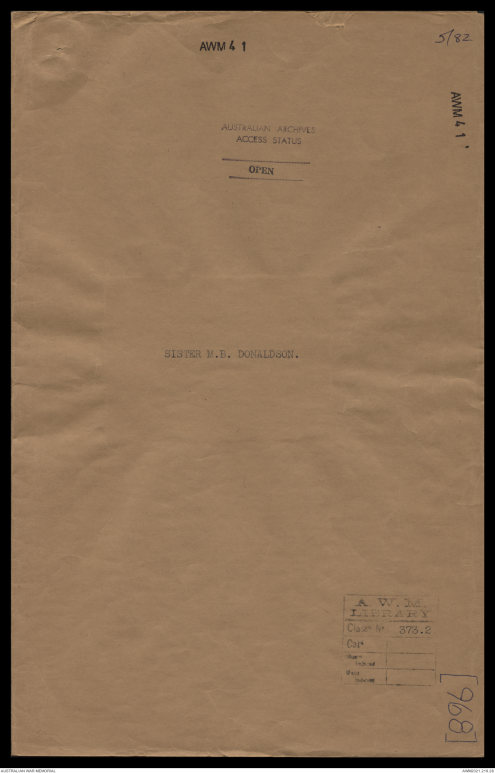
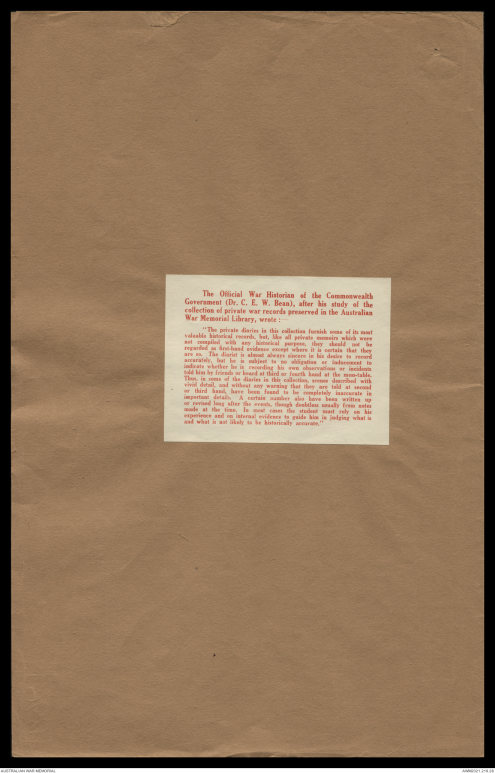
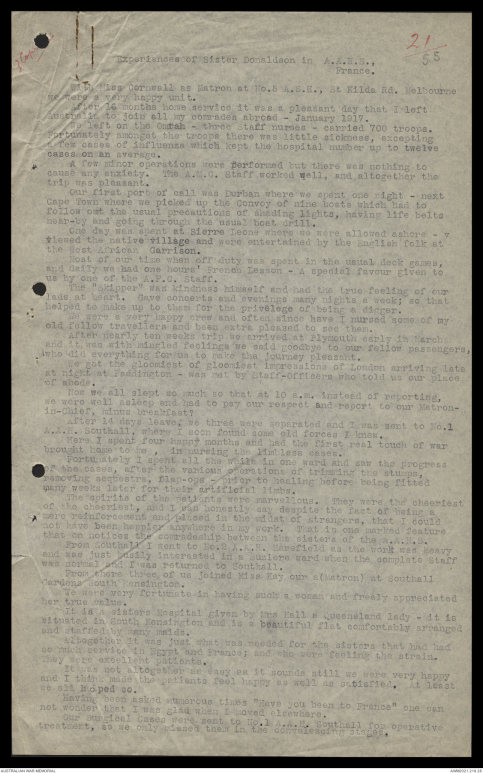
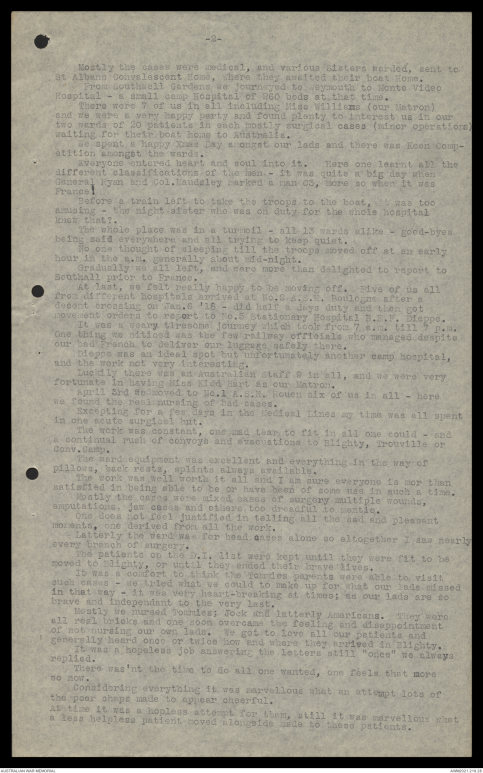
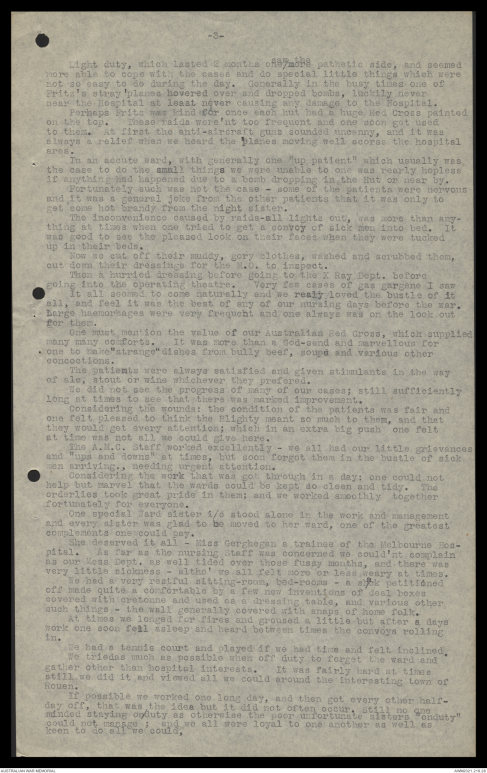
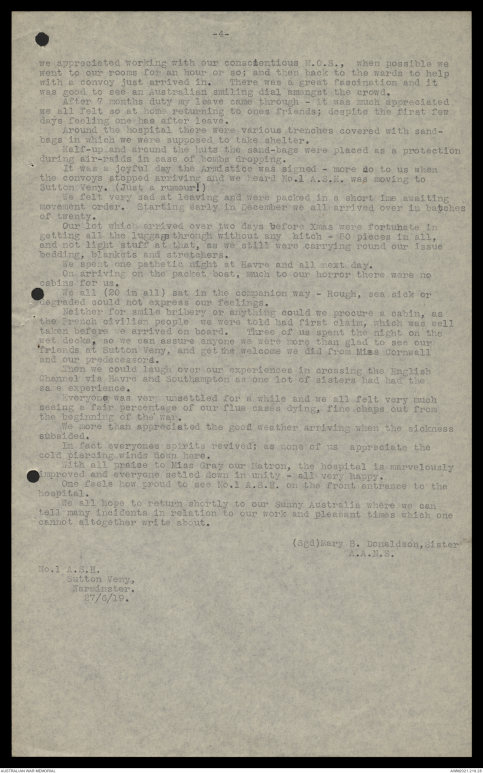
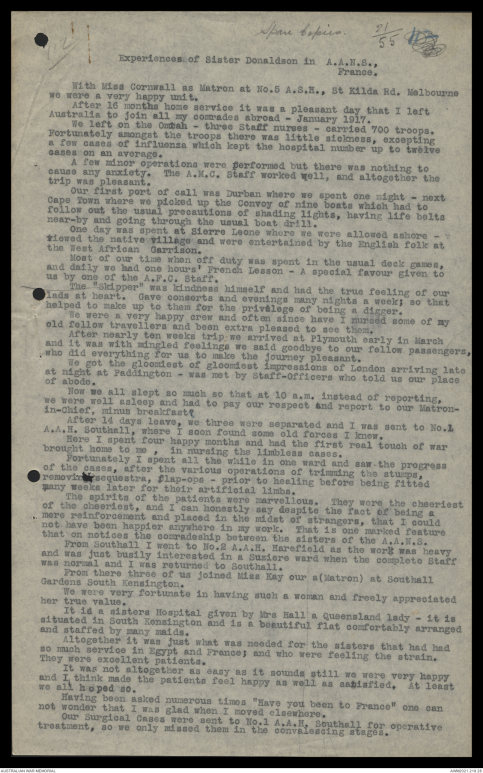
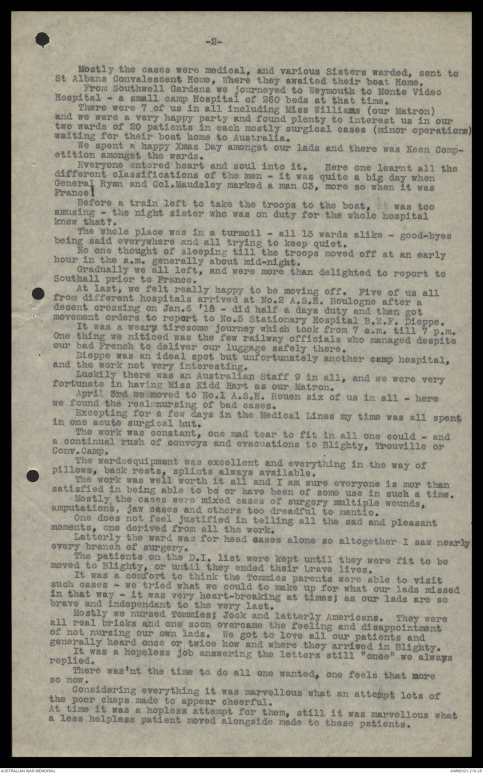
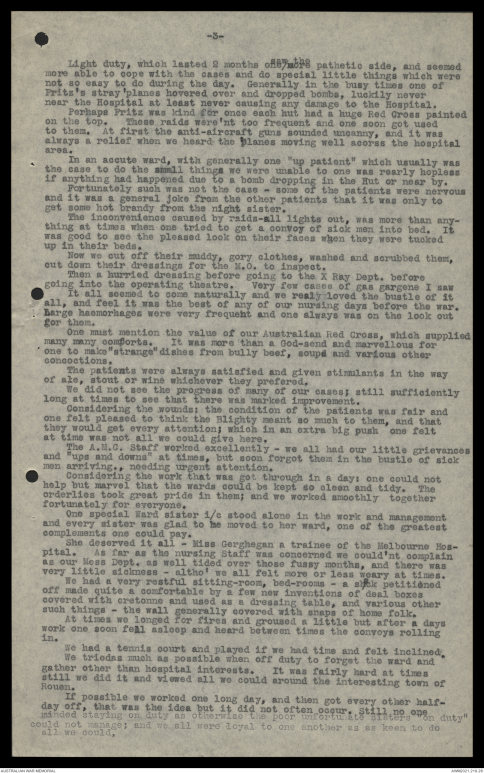
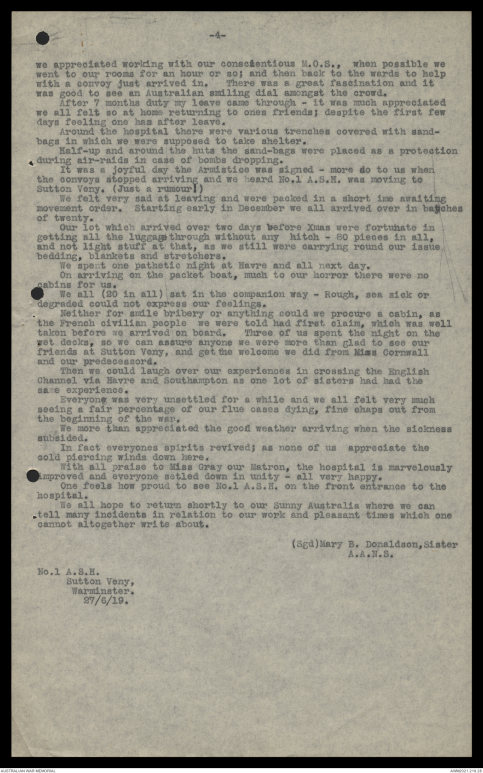
AWM 41 5/82
AUSTRALIAN ARCHIVE
ACCESS STATUS
—————————
OPEN
—————————
SISTER M. B. DONALDSON.
The Official War Histories of the Commonwealth
Government (Dr. C. E. W. Bean), after his study of the
collections of private war records preserved in the Australian
War Memorial Library, wrote:-
The private diaries in this collection furnish some of its most
valuable historical records, but, like all private souvenirs which were
not compiled with any historical purpose they should not be
regarded as first-hand evidence except where it is certain that they
are so. The diarist is almost always sincere in his desire to record
accurately, but for a subject to no obligation or or inforcement to
indicate whether he is recording his own observations or incidents
told him by friends, or heard as third or fourth hand at the mess-table.
Thus, in some of the diaries in this collection, events described with
vivid detail, and without any warning that they are told as second
or third hand, have been found to be completely inaccurate in
important details. A certain number also have been written up
or recorded long after the events, though doubtless usually from notes
made at the time. In most cases the student must rely on his
experiences and an internal evidence to guide him in judging what is
and what is not likely to be historically accurate."
3 Copies
Experiences of Sister Donaldson in A.A.H.S., 21/55
France.
With Miss Cornwall as Matron to No. 5 A.S.H., St. Kilda Rd. Melbourne
we were a very happy unit.
After 16 months home service it was a pleasant day that I left
Australia to join all my comrades abroad - January 1917.
We left on the Omish - three Staff nurses - carried 700 troops.
Fortunately amongst the troops there was little sickness, excepting
a few cases of influenza which kept the hospital number up to twelve
cases on average.
A few minor operations were performed but there was nothing to
cause any anxiety. The A.M.C. Staff worked well, and altogether the
trip was pleasant.
Our first port of call was Durban where we spent one night - near
Cape Town where we picked up the Convoy of nine boats which had to
follow out the usual precautions of shading lights, having life boats
near-by and going through the usual boat drill.
One day was spent at Sierre Leone where we were allowed ashore -
viewed the native village and were entertained by the English folk at
the West African Garrison.
Most of our time when off duty was spent in the usual deck games,
and daily we had one hours; French Lesson - A special favour given to
us by one of the A.F.C. Staff.
The "Skipper" was kindness himself and had the true feeling of our
lads at heart. Gave concerts and evenings many nights a week; so that
helped to make up to them for the privilege of being a digger.
We were a very happy crew and often since have I nursed some of my
old fellow travellers and been extra pleased to see them.
After nearly ten weeks trip we arrived at Plymouth early in March
and it was with mingled feelings we said goodbye to our fellow passengers,
who did everything for us to make the journey pleasant.
We got the gloomiest of gloomiest impressions of London arriving late
at night at Paddington - was met by Staff-Officers who told us our place
of abode.
Now we all slept so much so that t 10 a.m. instead of reporting,
we were well asleep and had to pay our respect and report to our Matron-
in-Chief, minus breakfast!
After 14 days leave; we three were then separated and I was sent to No. 1
A.I.H. Southall, where I soon found some old forces I knew.
Here I spent four happy months and had the first real touch of war
brought home to me , in nursing the limbless cases.
Fortunately I spent all the while in one ward and saw the progress
removing sequestra, flap-ops - prior to healing before being fitted
many weeks later for their artificial limbs.
The spirits of the patients were marvellous. They were the cheeriest
of the cheeriest, and I can honestly say despite the fact of being a
mere reinforcement and placed in the midst of strangers, that I could
not have been happier anywhere in my work. What is one marked feature that on notices the comradeship between the sisters of the A.A.H.S.
From Southall I went to No. 2 A.A.H. Harefield as the work was heavy
and was just busily interested in a Susiere ward when the complete Staff
was normal and I was returned to Southall.
From there three of us joined Miss Kay our (Matron) at Southall
Gardens South Kensington.
It is a sisters Hospital given by Mrs Hall a Queensland lady - it is
situated in South Kensington and is a beautiful flat comfortably arranged
and staffed by many maids.
Altogether it was just what was needed for the sisters that had had
so much service in Egypt and France; and who were feeling the strain.
They were excellent patients.
It was not altogether as easy as it sounds still we were very happy
and I think made the patients feel happy as well as satisfied. At least
we all hoped so.
Having been asked numerous times "Have you been to France" one can
not wonder that I was glad when I moved elsewhere.
Our Surgical Cases were sent to No. 1 A.A.H. Southall for operative
treatment, so we only missed then in the convalescing stages.
-2-
Mostly the cases were medical, and various Sisters warded, sent to
St Albans Convalescent Home, where they awaited their boat Home.
From Southall Gardens we journeyed to Waymouth to Monte Video
Hospital - a small camp Hospital of 260 beds at that time.
There were 7 of us in all including Miss Williams (our Matron)
and we were a very happy party and found plenty to interest us in our
two wards of 20 patients in each mostly surgical cases (minor operations)
waiting for their boat home to Australia.
We spent a happy Xmas Day amongst our lads and there was Keen Comp-
etition amongst the wards.
Everyone entered heart and soul into it. Here one learnt all the
different classifications of the men - it was quite a big day when
General Ryan and Col. Maudeley marked a man c3, more so when it was
France!
Before a train left to take the troops to the boat, it was too
amusing - the night sister who was on duty for the whole hospital
knew that.
The whole place was in a turmoil - all 12 wards alike - good-byes
being said everywhere and all trying to keep quiet.
No one thought of sleeping till the troops moved off at an early
hour in the a.m. generally about mid-night.
Gradually we all left, and were more than delighted to report to
Southall prior to France.
At last, we felt really happy to be moving off. Five of us all
from different Hospitals arrived at No. 2 A.S.H. Boulogne after a
decent crossing on Jan.6 '18 - did half a days duty and then got
movement orders to report to No. 5 Stationary Hospital B.E.F. Dieppe.
It was a weary tiresome journey which took from 7 a.m. till 7 p.m.
One thing we niticed was the few railway officials who managed despite
our bad French to deliver our luggage safely there.
Dieppe was an ideal spot but unfortunately another camp hospital,
and the work not very interesting.
Luckily there was an Australian Staff 9 in all, and we were very
fortunate in having Miss Kidd Hart as our Matron.
April 3rd we moved to No. 1 A.S.H. Rouen six of us in all - here
we found the real nursing of bad cases.
Excepting for a few days in the Medical Lines my time was all spent
in one acute surgical hut.
The work was constant, one mad tear to fit in all one could - and
a continual rush of convoys and evacuations to Blighty, Trouville or
Conv. Camp.
The ward equipment was excellent and everything in the way of
pillows, back rests, splints always available.
The work was well worth it all and I am sure everyone is mor than
satisfied in being able to be or have been of some use in such a time.
Mostly the cases were mixed cases of surgery multiple wounds,
amputations, jaw cases and others, too dreadful to mentio.
One does not feel justified in telling all the sad and pleasant
moments, on derived from all the work.
Latterly the ward was for head cases alone so altogether I saw nearly
every branch of surgery.
The patients on the D.I. list ward kept until they were fit to be
moved to Blighty, or until they ended their brave lives.
It was a comfort to think the Tommies parents were able to visit
such cases - we tried what we could to make up for what our lads missed
in that way - it was very heart-breaking at times; as our lads are so
brave and independent to the very last.
Mostly we nursed Tommies; Jock and latterly Americans. They were
all real bricks and one soon overcame the feeling and disappointment
of not nursing our lads. We got to love all our patients and
generally heard once or twice how and where they arrived in Blighty.
It was a hopeless job answering the letters still ''once' we always
replied.
There was'nt the time to do all one wanted, and feels that more
so now.
Considering everything it was marvellous that an attempt lots of the poor chaps made to appear cheerful.
At time it was a hopeless attempt for them, still it was marvellous that
a less helpless patient moved alongside made to these patients.
-3-
Light duty, which lasted 2 months one ∧saw the more pathetic side, and seemed
more able to cope with the cases and do special little things which were
not so easy to do during the day. Generally in the busy times one of
Fritz's stray 'planes hovered over and dropped bombs, luckily never
near the Hospital at least never causing any damage to the Hospital.
Perhaps Fritz was kind for once each hut had a huge Red Cross painted
on the top. These raids were'nt too frequent and one soon got used
to them. At first the anti-aircraft guns sounded uncanny, and it was
always a relief when we heard the 'planes moving well across the hospital
area.
In an accute ward, with generally one "up patient" which usually was
the case to do the small things we were unable to one was rearly hopeless
if anything happened due to a bomb dropping in the Hut or near by.
Fortunately such was not the case - some of the patients were nervous
and it was a general joke from the other patients that it was only to
get some hot brandy from the night sister.
The inconvenience caused by raids-all lights out, was more than any-
thing at times when we tried to get a convoy of sick men into bed. It
was good to see the pleased look on their faces when they were tucked
up in their beds.
Now we cut off their muddy, gory clothes, washed and scrubbed then,
cut down their dressings for the M.O. to inspect.
Then a hurried dressing before going to the X-Ray Dept. before
going into the operating theatre. Very few cases of gas gargene I saw
It all seemed to come naturally and we really loved the bustle of it
all, and feel it was the best of any of our nursing days before the war.
Large haemorhages were very frequent and one always was on the look out
for them.
One must mention the vlue of our Australian Red Cross, which supplied
many many comforts. It was more than a God-send and marvellous for
one to make "strange" dishes from bully beef, soups and various other
concoctions.
The patients were always satisfied and given stimulants in the way
of ale, stout or wine whichever they preferred.
We did not; see the progress of many of our cases; still sufficiently
long at times to see that there was marked improvement.
Considering the wounds; the condition of the patients was fair and
one felt pleased to think the Blighty meant as much to them, and that
they would get every attention which in an extra big push one felt
at time was not all we could give here.
The A.H.C Staff worked excellently - we all had our little grievances
and "ups and downs" at times, but soon forgot them in the bustle of sick.
men arriving., needing urgent attention.
considering the work that was got through in a day; one could not
help but marvel that the wards could be kept so clean and tidy. The
orderlies took great pride in them; and we worked smoothly together
fortunately for everyone.
One special Ward sister i/c stood alone in the work and management
and every sister was glad to be moved to her ward, one of the greatest
compliments one could pay.
She deserved it all - Miss Gerghagan a trainee of the Melbourne Hos-
pital. As far as the nursing Staff was concerned we could'nt complain
as our Mess Dept. as well tidied over those fussy months, and there was
very little sickness - altho' we all felt more or less weary at times.
We had a very restful sitting-room, bed-room - a shack petitioned
off made a comfortable by a few new inventions of deal boxes
covered with cretonne and used as a dressing table, and various other
such things - the wall generally covered with snaps of home folk.
At times as we longed for fires and groused a little but after a days
work one soon fell asleep and heard between times the convoo\ys rolling
in.
We had a tennis court and played if we had time and felt inclined.
We triedas much as possible when off duty to forget the ward and
gather other than hospital interests. It was fairly hard at times
still we did it and viewed all we could around the interesting town of
Rouen.
If possible we worked on long day, and then got every other half-
day off, that was the idea but it did not often occur. still no ops
indeed staying on duty as otherwise the poor unfortunate Sisters
"on duty"
could not manage; and we all were loyal to one another as or keen to do
all we could.
-4-
we appreciated working with our conscientious M.O.S., when possible we
went to our rooms for an hour or so; and then back to the wards to help
with a convoy just arrived in. There was a great fascination and it
was good to see an Australian smiling dial amongst the crowd.
After 7 months duty my leave came through - it was much appreciated
we all felt so at home returning to ones friends; despite the first few
days feeling one has after leave.
Around the hospital there were various trenches covered with sand-
bags in which we were supposed to take shelter.
Well-up and around the huts the sand-bags were placed as a protection
during air-raids in case of bombs dropping.
It was a joyful day the Armistice was signed - more so to us when
the convoys stopped arriving and we heard No. 1 A.S.H. was moving to
Sutton Veny. (Just a rumour!)
We felt very sad at leaving and ere packed in a short time awaiting
movement order. Starting early in December we all arrived over in batches
of twenty.
Our lot which arrived over two days before Xmas more fortunate in
getting all the luggage through without any hitch - [[?20?]] pieces in all,
and not light stuff at that, so we still were carrying round our Issue
bedding, blankets and stretchers.
We spent one pathetic night at Havre and all next day.
On arriving on the packed boat, much to our horror there were no
cabins for us.
We all (20 in all) sat in the companion way - Rough, sea sick or
degraded could not express our feelings.
Neither for smile bribery or anything could we procure a cabin, as
the French civilian people we were told had first claim, which was well
taken before we arrived on board. Three of us spent the night on the
wet decks, so we can assure we were more than glad to see our
friends at Sutton Veny, and get the welcome we did from Miss Cornwall and our predecessors.
Then we could laugh over our experiences in crossing the English
Channel via Havre and Southampton as one lot of sisters had had the
same experience.
Everyone was very unsettled for a while and we all felt very much
seeing a fair percentage of our flue cases dying, fine chaps out from
the beginning of the War.
We more than appreciated the good weather arriving when the sickness
subsided.
In fact everyones spirits revived; as some of us appreciate the
cold piercing winds down here.
With all praise to Miss Gray our Matron, the Hospital is marvelously
improved and everyone setled down in unity - all very happy.
One feels so proud to see No. 1 A.S.H. on the front entrance to the
hospital.
We all hope to return shortly to our Sunny Australia where we can
tell many incidents in relation to our work and pleasant times which one
cannot altogether write about.
(sgd)Mary B. Donaldson,Sister
A.A.N.S.
No. 1 A.S.H.
Sutton Veny,
Warminster,
27/4/19.
Spare Copies 21/55
Experiences of Sister Donaldson in A.A.N.S.,
France.
With Miss Cornwall as Matron at No.5 A.S.H., St Kilda Rd. Melbourne
we were a very happy unit.
After 16 months home service it was a pleasant day that I left
Australia to join all my comrades abroad - January 1917.
We left on the Omish - three Staff nurses - carried 700 troops.
Fortunately amongst the troops there was little sickness, excepting
a few cases of influenza which kept the hospital number up to twelve
cases on an average.
A few minor operations were performed but there was nothing to
cause any anxiety. The A.M.C. Staff worked well, and altogether the
trip was pleasant.
Our first port of call was Durban where we spent one night - next
Cape Town where we picked up the Convoy of nine boats which had to
follow out the usual precautions of shading lights, having life boats
near-by and going through the usual boat drill.
One day was spent at Sierre Leone where we were allowed ashore -
viewed the native village and were entertained by the English folk at
the West African Garrison.
Most of our time when off duty was spent in the usual deck games,
and daily we had one hours; French Lesson - A special favour given to
us by one of the A.F.C. Staff.
The "Skipper" was kindness himself and had the true feeling of our
lads at heart. Gave concerts and evenings many nights a week; so that
helped to make up to them for the privilege of being a digger.
We were a very happy crew and often since have I nursed some of my
old fellow travellers and been extra pleased to see them.
After nearly ten weeks trip we arrived at Plymouth early in March
and it was with mingled feelings we said goodbye to our fellow passengers,
who did everything for us to make the journey pleasant.
We got the gloomiest of gloomiest impressions of London arriving late
at night at Paddington - was met by Staff-Officers who told us our place
of abode.
Now we all slept so much so that t 10 a.m. instead of reporting,
we were well asleep and had to pay our respect and report to our Matron-
in-Chief, minus breakfast!
After 14 days leave; we three were then separated and I was sent to No. 1
A.I.H. Southall, where I soon found some old forces I knew.
Here I spent four happy months and had the first real touch of war
brought home to me , in nursing the limbless cases.
Fortunately I spent all the while in one ward and saw the progress
removing sequestra, flap-ops - prior to healing before being fitted
many weeks later for their artificial limbs.
The spirits of the patients were marvellous. They were the cheeriest
of the cheeriest, and I can honestly say despite the fact of being a
mere reinforcement and placed in the midst of strangers, that I could
not have been happier anywhere in my work. What is one marked feature that on notices the comradeship between the sisters of the A.A.H.S.
From Southall I went to No. 2 A.A.H. Harefield as the work was heavy
and was just busily interested in a Susiere ward when the complete Staff
was normal and I was returned to Southall.
From there three of us joined Miss Kay our (Matron) at Southall
Gardens South Kensington.
It is a sisters Hospital given by Mrs Hall a Queensland lady - it is
situated in South Kensington and is a beautiful flat comfortably arranged
and staffed by many maids.
Altogether it was just what was needed for the sisters that had had
so much service in Egypt and France; and who were feeling the strain.
They were excellent patients.
It was not altogether as easy as it sounds still we were very happy
and I think made the patients feel happy as well as satisfied. At least
we all hoped so.
Having been asked numerous times "Have you been to France" one can
not wonder that I was glad when I moved elsewhere.
Our Surgical Cases were sent to No. 1 A.A.H. Southall for operative
treatment, so we only missed then in the convalescing stages.
-2-
Mostly the cases were medical, and various Sisters warded, sent to
St Albans Convalescent Home, where they awaited their boat Home.
From Southall Gardens we journeyed to Waymouth to Monte Video
Hospital - a small camp Hospital of 260 beds at that time.
There were 7 of us in all including Miss Williams (our Matron)
and we were a very happy party and found plenty to interest us in our
two wards of 20 patients in each mostly surgical cases (minor operations)
waiting for their boat home to Australia.
We spent a happy Xmas Day amongst our lads and there was Keen Comp-
etition amongst the wards.
Everyone entered heart and soul into it. Here one learnt all the
different classifications of the men - it was quite a big day when
General Ryan and Col. Maudeley marked a man c3, more so when it was
France!
Before a train left to take the troops to the boat, it was too
amusing - the night sister who was on duty for the whole hospital
knew that.
The whole place was in a turmoil - all 12 wards alike - good-byes
being said everywhere and all trying to keep quiet.
No one thought of sleeping till the troops moved off at an early
hour in the a.m. generally about mid-night.
Gradually we all left, and were more than delighted to report to
Southall prior to France.
At last, we felt really happy to be moving off. Five of us all
from different Hospitals arrived at No. 2 A.S.H. Boulogne after a
decent crossing on Jan.6 '18 - did half a days duty and then got
movement orders to report to No. 5 Stationary Hospital B.E.F. Dieppe.
It was a weary tiresome journey which took from 7 a.m. till 7 p.m.
One thing we niticed was the few railway officials who managed despite
our bad French to deliver our luggage safely there.
Dieppe was an ideal spot but unfortunately another camp hospital,
and the work not very interesting.
Luckily there was an Australian Staff 9 in all, and we were very
fortunate in having Miss Kidd Hart as our Matron.
April 3rd we moved to No. 1 A.S.H. Rouen six of us in all - here
we found the real nursing of bad cases.
Excepting for a few days in the Medical Lines my time was all spent
in one acute surgical hut.
The work was constant, one mad tear to fit in all one could - and
a continual rush of convoys and evacuations to Blighty, Trouville or
Conv. Camp.
The ward equipment was excellent and everything in the way of
pillows, back rests, splints always available.
The work was well worth it all and I am sure everyone is mor than
satisfied in being able to be or have been of some use in such a time.
Mostly the cases were mixed cases of surgery multiple wounds,
amputations, jaw cases and others, too dreadful to mentio.
One does not feel justified in telling all the sad and pleasant
moments, on derived from all the work.
Latterly the ward was for head cases alone so altogether I saw nearly
every branch of surgery.
The patients on the D.I. list ward kept until they were fit to be
moved to Blighty, or until they ended their brave lives.
It was a comfort to think the Tommies parents were able to visit
such cases - we tried what we could to make up for what our lads missed
in that way - it was very heart-breaking at times; as our lads are so
brave and independent to the very last.
Mostly we nursed Tommies; Jock and latterly Americans. They were
all real bricks and one soon overcame the feeling and disappointment
of not nursing our lads. We got to love all our patients and
generally heard once or twice how and where they arrived in Blighty.
It was a hopeless job answering the letters still ''once' we always
replied.
There was'nt the time to do all one wanted, and feels that more
so now.
Considering everything it was marvellous that an attempt lots of the poor chaps made to appear cheerful.
At time it was a hopeless attempt for them, still it was marvellous that
a less helpless patient moved alongside made to these patients.
-3-
Light duty, which lasted 2 months one ∧saw the more pathetic side, and seemed
more able to cope with the cases and do special little things which were
not so easy to do during the day. Generally in the busy times one of
Fritz's stray 'planes hovered over and dropped bombs, luckily never
near the Hospital at least never causing any damage to the Hospital.
Perhaps Fritz was kind for once each hut had a huge Red Cross painted
on the top. These raids were'nt too frequent and one soon got used
to them. At first the anti-aircraft guns sounded uncanny, and it was
always a relief when we heard the 'planes moving well across the hospital
area.
In an accute ward, with generally one "up patient" which usually was
the case to do the small things we were unable to one was rearly hopeless
if anything happened due to a bomb dropping in the Hut or near by.
Fortunately such was not the case - some of the patients were nervous
and it was a general joke from the other patients that it was only to
get some hot brandy from the night sister.
The inconvenience caused by raids-all lights out, was more than any-
thing at times when we tried to get a convoy of sick men into bed. It
was good to see the pleased look on their faces when they were tucked
up in their beds.
Now we cut off their muddy, gory clothes, washed and scrubbed then,
cut down their dressings for the M.O. to inspect.
Then a hurried dressing before going to the X-Ray Dept. before
going into the operating theatre. Very few cases of gas gargene I saw
It all seemed to come naturally and we really loved the bustle of it
all, and feel it was the best of any of our nursing days before the war.
Large haemorhages were very frequent and one always was on the look out
for them.
One must mention the vlue of our Australian Red Cross, which supplied
many many comforts. It was more than a God-send and marvellous for
one to make "strange" dishes from bully beef, soups and various other
concoctions.
The patients were always satisfied and given stimulants in the way
of ale, stout or wine whichever they preferred.
We did not; see the progress of many of our cases; still sufficiently
long at times to see that there was marked improvement.
Considering the wounds; the condition of the patients was fair and
one felt pleased to think the Blighty meant as much to them, and that
they would get every attention which in an extra big push one felt
at time was not all we could give here.
The A.H.C Staff worked excellently - we all had our little grievances
and "ups and downs" at times, but soon forgot them in the bustle of sick.
men arriving., needing urgent attention.
considering the work that was got through in a day; one could not
help but marvel that the wards could be kept so clean and tidy. The
orderlies took great pride in them; and we worked smoothly together
fortunately for everyone.
One special Ward sister i/c stood alone in the work and management
and every sister was glad to be moved to her ward, one of the greatest
compliments one could pay.
She deserved it all - Miss Gerghagan a trainee of the Melbourne Hos-
pital. As far as the nursing Staff was concerned we could'nt complain
as our Mess Dept. as well tidied over those fussy months, and there was
very little sickness - altho' we all felt more or less weary at times.
We had a very restful sitting-room, bed-room - a shack petitioned
off made a comfortable by a few new inventions of deal boxes
covered with cretonne and used as a dressing table, and various other
such things - the wall generally covered with snaps of home folk.
At times as we longed for fires and groused a little but after a days
work one soon fell asleep and heard between times the convoo\ys rolling
in.
We had a tennis court and played if we had time and felt inclined.
We triedas much as possible when off duty to forget the ward and
gather other than hospital interests. It was fairly hard at times
still we did it and viewed all we could around the interesting town of
Rouen.
If possible we worked on long day, and then got every other half-
day off, that was the idea but it did not often occur. still no ops
indeed staying on duty as otherwise the poor unfortunate Sisters
"on duty"
could not manage; and we all were loyal to one another as or keen to do
all we could.
-4-
we appreciated working with our conscientious M.O.S., when possible we
went to our rooms for an hour or so; and then back to the wards to help
with a convoy just arrived in. There was a great fascination and it
was good to see an Australian smiling dial amongst the crowd.
After 7 months duty my leave came through - it was much appreciated
we all felt so at home returning to ones friends; despite the first few
days feeling one has after leave.
Around the hospital there were various trenches covered with sand-
bags in which we were supposed to take shelter.
Well-up and around the huts the sand-bags were placed as a protection
during air-raids in case of bombs dropping.
It was a joyful day the Armistice was signed - more so to us when
the convoys stopped arriving and we heard No. 1 A.S.H. was moving to
Sutton Veny. (Just a rumour!)
We felt very sad at leaving and ere packed in a short time awaiting
movement order. Starting early in December we all arrived over in batches
of twenty.
Our lot which arrived over two days before Xmas more fortunate in
getting all the luggage through without any hitch - [[?20?]] pieces in all,
and not light stuff at that, so we still were carrying round our Issue
bedding, blankets and stretchers.
We spent one pathetic night at Havre and all next day.
On arriving on the packed boat, much to our horror there were no
cabins for us.
We all (20 in all) sat in the companion way - Rough, sea sick or
degraded could not express our feelings.
Neither for smile bribery or anything could we procure a cabin, as
the French civilian people we were told had first claim, which was well
taken before we arrived on board. Three of us spent the night on the
wet decks, so we can assure we were more than glad to see our
friends at Sutton Veny, and get the welcome we did from Miss Cornwall and our predecessors.
Then we could laugh over our experiences in crossing the English
Channel via Havre and Southampton as one lot of sisters had had the
same experience.
Everyone was very unsettled for a while and we all felt very much
seeing a fair percentage of our flue cases dying, fine chaps out from
the beginning of the War.
We more than appreciated the good weather arriving when the sickness
subsided.
In fact everyones spirits revived; as some of us appreciate the
cold piercing winds down here.
With all praise to Miss Gray our Matron, the Hospital is marvelously
improved and everyone setled down in unity - all very happy.
One feels so proud to see No. 1 A.S.H. on the front entrance to the
hospital.
We all hope to return shortly to our Sunny Australia where we can
tell many incidents in relation to our work and pleasant times which one
cannot altogether write about.
(sgd)Mary B. Donaldson,Sister
A.A.N.S.
No. 1 A.S.H.
Sutton Veny,
Warminster,
27/4/19.
 Sam scott
Sam scottThis transcription item is now locked to you for editing. To release the lock either Save your changes or Cancel.
This lock will be automatically released after 60 minutes of inactivity.